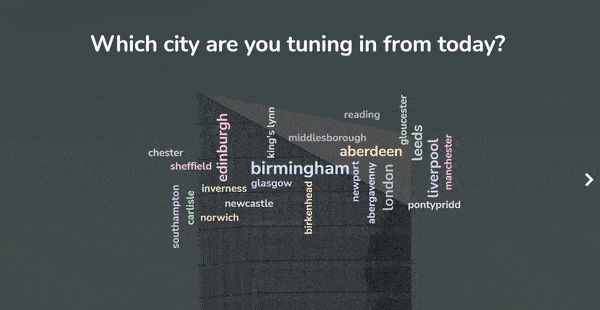Texting is the sending of messages through network providers. This is the predecessor of «chatting» through social networking sites, although today, the term has also come to refer to this kind of messaging as well. Check out the following slang words for texting!
Slang Words for Texting (in Alphabetical Order)
Buzz
Meaning:
- (Verb) To buzz someone is to send them a message/note.
- Example: Don’t keep buzzing me when I’m in a meeting. I’ll not be able to reply anyway.
Check With
Meaning:
- (Verb) To express concern or relay a request via texting.
- Example: I was checking with Noah if he could cover my weekend shift at the restaurant. He called me a few minutes later.
Chew the Fat
Meaning:
- (Verb) This expression means to talk about trivial gossip and complaints through convenient means which is usually by texting.
- Example: Allyssa is chewing the fat on the prom king and queen’s breakup through the prom queen’s best friend.
Drop a Line
Meaning:
- (Verb) To send somebody a short text message.
- Example: Drop me a line if you need anything.
Drunk Texting
Meaning:
- (Verb) Like how it is phrased, this means to text someone under the influence of alcohol. Regret usually hits when the now sober person realizes what they have done.
- Example: Megan is drunk texting her ex about how ugly and insecure his current girlfriend is. We know she’ll apologize in the morning.
Get Ahold of
Meaning:
- (Verb) To establish means of communication.
- Example: The secretary could not get ahold of the missing company vice-president for two weeks.
Have a Confab
Meaning:
- (Verb) Shortened for “having a confabulation”, this expression means to have a conversation in a private setting. In a digital context, this means to text someone with confidential information.
- Example: Kyle and his friends are having a confab on how he will sneak out of the house to attend the party.
Leave a Note
Meaning:
- (Verb) Usually to scribble on a small piece of paper, to “leave a note” is to text a brief or follow-up message.
- Example: Once you get the flowers, Louis will leave you a note where to send them.
Messaging
Meaning:
- (Verb) The most popular way of saying “texting”, which includes social media and chat platforms.
- Example: Christine is messaging her friends to stop by her house for a freshly baked cake.
Pen Pal
Meaning:
- (Noun) Usually a “pen pal” is a friend made through snail mailing, a pen pal has evolved to be a “text mate”.
- Example: Little did Archie know that his pen pal is the cheerleading captain, Veronica.
Ping Someone
Meaning:
- (Verb) Similar to “buzzing” someone, “ping someone” uses the popping text notification sound as a way to say to text someone.
- Example: Ping me when you’re by my door; I don’t want my parents to open for you.
Sexting
Meaning:
- (Verb) A slang term that that is portmanteau of “sex” and “texting” which refers to the exchange of sexually provocative messages.
- Example: After a month of endless sexting, Allie and Cameron finally went on a date.
SMSing
Meaning:
- (Verb) SMS is the technical slang for text which stands for “short message service”. When “SMSing” is used, this gives a nod to its techy origins.
- Example: The computer engineering student is SMSing his girlfriend to meet him in a nearby cafe.
Staying in Touch
Meaning:
- (Verb) This is a popular phrase for maintaining contact through the agreed means which typically involves texting.
- Example: Mrs. Gomez left her cellphone number to stay in touch with the lawyer who is handling her libel charges.
Touch Base
Meaning:
- (Verb) A baseball slang that found its way to corporate use. To “touch base” is to rekindle connections normally by text, call, or email.
- Example: The CEO touched base with a former competitor that went on to new ventures.
Slang Words! Slang words are defined as the words and phrases used informally in any language. Following is a list of 100 English slang words that are commonly used today. Most of them are American slang words and phrases.
Slang Words | Video
https://www.youtube.com/watch?v=VV9ewwMyceA
Slang Words | Slang Dictionary
List of 100 English slang words and phrases with their meanings and examples:
- Eye-popping – fantastic, astonishing
The New York Times had an eye-popping article this morning.
- Chicken – a coward
You’re a chicken, Tom!
- Con – Swindle
He tried to con me out of $20.
- Couch potato – people who watching T.V all day
You are such a couch potato on weekends.
- Ball – a good time
We had a ball at the party last night.
- Bazillion – uncountable number/ a very big number
We gets a bazillion followers everyday on Facebook fan page.
- Croak – to die
She married a millionaire just about to croak.
- Neat – excellent
Your house is always so neat – how do you manage it with three children?
- Nuts – crazy, mad
She’s beautiful. I’m nuts about her.
- Big guns – powerful, influenced people
Jed wanted to impress a Harvard professor and some other big guns.
- Dynamite – great, awesome
That teenager singer is really dynamite!
- Earful – scolding / reprimanding
I bet Sue gave you an earful when you got home.
- Bitch – complain/ gossip about something
Whenever the girls get together, they always find something to bitch about.
- Bonkers – mad/ insane
The man must be bonkers to take such a risk.
- Break – chance/ opportunity
Never give a sucker an even break.
- Bummed – sad or disappointed
I was really bummed out that there were no tickets left.
- Cheesy – cheap, outdated
We went to some cheesy bar in Baltimore.
- Cruising – going at a high speed
We fly at a cruising speed of 500 mph.
- Cushy – comfortably easy
It’s a cushy life for the rich.
- Deck – hit some on the face
Do that again and I’ll deck you.
- Deep pockets – having a lot of money
They’re looking for someone with deep pockets to pay for the research.
- Dinosaur – something or someone is very old
The Health Service has become a dinosaur. It needs radical reform if it is to survive.
- Airhead – a foolish/ dumb person
Boy, that salesman was the biggest airhead I’ve ever seen.
- Eyeball – look at, look over.
Challenge him, eyeball him, intimidate him.
- Fender-bender – a minor accident/collision between two vehicles
Another time I missed a date because I got into a fender-bender on the way there.
- Idiot box – the television
Phil has been staring at the idiot box all afternoon.
- Icky – unpleasant or annoying
What is this icky old stuff?
- Jam – trouble
How are we going to get ourselves out of this jam?
Slang dictionary | Infographic
- Hang out -spend time together in a place frequently
We often used to hang out in supermarkets.
- All-nighter – study all night
I pulled an all-nighter last night.
- Ditch – leave, abandon something
Let’s ditch school today.
- Flicks – films/ movies
What’s on at the flicks this week?
- Freebie – something that is free
All the journalists were given a freebie lunch.
- Gig – work, job
I had got totally pissed and had to do a gig that night.
- Guts – courage or boldness
Barbara hasn’t got the guts to leave her mother.
- Go bananas – go crazy
Love is making you go bananas!
- Goof off – Wasting time, not doing anything in particular
He’s been goofing off at school.
- Grand – thousand dollars
He lives in a grand house.
- Heave – vomit
The smell of the fish made me/my stomach heave.
- Hot – attractive
You look so hot in that dress!
- Hustle – leave hurriedly
I love the hustle and bustle of the marketplace.
- Glitch – defect or problem
This minor glitch has turned into a big problem for the airline.
- Jock – someone who plays a sport
She is a jock from a family of jocks, articulate only in that special, odd way that coaches are articulate.
- John – toilet
I need to meet John, r-i-g-h-t n-o-w!
- Junkie – a drug addict
His son was a junkie, the kid OD’d a year ago.
- Grub – food
Get yourself some grub and come and sit down.
- Loli – young female with a childlike appearance
This might sound weird, but I am a loli lover!
- Peanuts – very little money
He gets paid peanuts for doing that job.
- Rocking – great, awesome
He had a rocking performance!
- Shades – sunglasses
She was dressed in muted shades of blue.
- Sucks – awful or unacceptable
Life sucks, but worth fighting for.
- Meltdown – the completely breaking down
The stock market crash might lead to financial meltdown.
- Mickey mouse – something that does not make sense
It’s only a Mickey Mouse job.
- Oddball – weird, unusual person
The new boss is a bit of an oddball.
- Pissed off – extremely annoyed
I’m pissed off with the way they’ve treated me.
- Zero – an unimportant person
He is a zero in his family.
- Zit – pimple
I applied some pimple cream on the big zit on my face.
- Crap – worthless thing or a lie
You’re talking a load of crap!
- Crash – sleep
I just want to crash out on the sofa.
- Crash – break into/ attempt to get in somewhere
Last night, a thief crashed my house. Luckily, He was arrested by the polices.
Slang dictionary | Infographic
- Quarterback – lead or initiative
The Carolina Panthers were playing with a backup quarterback.
- Beemer – a BMW car
He’s got a new beemer, what a rich man!
- Quick buck – Easy getting money
I need to make a quick buck without much effort.
- K – A thousand of a currency
It costs 10k.
- Kick back – relax
Kick back, make yourself at home.
- Raw – new and inexperienced
Raw meat must be kept separate from cooked meat.
- Razz – annoy
The pupils are razzing the teacher.
- Umpteen – incalculable
We’ve been there umpteen times and she still can’t remember the way.
- Whiz – Be talented at something
Apparently, he is a whiz at thank – you notes!
- Wimp – a cowardly person
Don’t be such a wimp.
- Up – Feeling cheerful or in good spirits
She feels up and down all day.
- UwU – a reaction to something cute
Bf: I love you bae Gf: Aww Ily UwU
- Vibes – atmosphere or feelings
I have good vibes about this contract.
- Wheels – a car
I’ve got a new wheels on my birthday.
Slang Words | Image
Slang dictionary | Image 1
Slang dictionary | Image 2
Slang dictionary | Image 3
At EnglishClass101, we show you how to use the basics of the language correctly, with loads of aids and easy-to-use tools! Yet learning the slang words and phrases, as well as the texting acronyms of any new language, will greatly increase your ability to chat with native speakers. They often serve to enhance conversation and add color to what you need to say online, without using many words.
Slang language is defined, according to Google dictionary, as “a type of language consisting of words and phrases that are regarded as very informal, are more common in speech than writing, and are typically restricted to a particular context or group of people.”
So, you should be able to see that if you want in with any community of English locals, it’ll be helpful to get to know their slang.
That said, some slang is universal, and is widely used on the internet. The most popular online spaces include forums and social media platforms such as Reddit, Twitter, Facebook, Instagram, and so on.
Internet slang or text abbreviations appear in the form of acronyms (shortening a sentence or phrase by writing only the first letters of the words), which was made popular on platforms like Twitter, where you can post only a limited number of characters.
For instance, “lol” comes in handy, when you don’t have space to write out “laugh out loud.”
Another form of internet slang is specific words or short phrases that have a meaning other than what they normally do in English. Sometimes, they convey a feeling, or take the place of facial expressions, such as “facepalm,” to depict embarrassment or exasperation.
In other cases, they are completely new words with unique uses. As they say, sometimes just one word tells a whole story—the internet has a whole lingo of its own like that.
In this blog, we offer you a list of the most-used text abbreviations in the form of acronyms, as well as internet slang. So be sure to add these to your arsenal of English vocabulary!
- Acronyms
- Internet Slang
- Conclusion
1. Acronyms
Internet-specific acronyms started appearing almost as soon as social media did. They’re written in capital letters or lowercase, your choice. Scroll through these popular text slangs and chat abbreviation, and start practicing!
1- DSL—Don’t Stay Long/Dumb Stupid Loser
This acronym can have many meanings, but these two are the most commonly used. Not very polite to call someone a “dumb, stupid loser,” so use with discretion.
2- IKR—I Know, Right
This is an American expression mainly used in casual conversation. You use “IKR” to indicate that you fully agree with someone.
This is one of the older internet slang acronyms, so you may want to read up on its history and learn more about its usage.
3- LOL—Laugh Out Loud or Laughing Out Loud
This is one of the first internet slang or text acronyms to find its way onto our screens. We’ve been LOL-ing for decades on social media in reaction to funnies.
However, “LOL” is considered rather outmoded…you’d be more modern if you use the following acronym.
4- Lulz—Laughs
As you can see, “Lulz” is sort of derived from “LOL,” and in addition to indicating that you’re laughing about something, it can also mean “just for laughs.”
5- LMAO—Laugh My Ass Off
The same goes for this one, also an oldie. If “LOL” isn’t strong enough, and you’ve practically ruptured your spleen laughing at something because it’s so funny, “LMAO” is the way to make this known on social media.
Of course this is just an expression; it doesn’t mean you’re literally laughing so hard your backside slides off.
6- ROFL—Roll On Floor Laughing
“ROFL” is similar to “LMAO,” meaning you need to express strongly that something is so hysterically funny, you can barely remain standing.
7- WTF—What The F***
Your chance to swear without offending anyone. This is another abbreviation from long ago that denotes surprise and astonishment, usually in response to something shocking, hugely surprising, or negative.
8- Dafuq—(What) the F***?!
WTF’s more elaborate, non-acronym cousin, which is used in exactly the same way. It’s a new word, really, of which the meaning only becomes clear once you pronounce it.
9- FML—F*** My Life
Still on the topic of legitimate expletives, “FML” is a way for you to comment on something unfortunate that’s happened to you. Also an old text slang acronym, it can be used this way:
“Just had my car professionally wax polished, cost a fortune; drove out and two birds pooped on it. FML.”
This text acronym even has its own website, where people share their misfortunes to be rated.
10- IDGAF—I Don’t Give A F***
A rather crass way to state emphatically that you don’t care.
11- NSFW—Not Safe/Suitable For Work
Some photos and material on the internet is sensitive in nature, meaning that it contains nudity, graphic images, or foul language. This acronym signals that you should take care when viewing the material, as it’s not for everyone’s eyes and might offend someone.
12- NSFL—Not Safe For Life
The former acronym means it’s OK to view the material when you’re not in a work or formal environment. Not “NSFL.” This means the material is particularly graphic and can even be emotionally or mentally scarring. It’s not as often used as “NSFW.”
13- PAW—Parents Are Watching
Probably more popular among teenagers, “PAW” serves as a warning that parents are around.
14- BRB—Be Right Back
This simply is what it says—you’re informing your chat-mate that you need to take a break from the conversation, but will be back soon.
15- MIRL—Me In Real Life
Often used to make fun of yourself, and is usually accompanied by a pic, reaction GIF, or a video.
16- NVM—Nevermind
This one’s pretty self-explanatory, meaning “No need to mind it any longer” or “Don’t worry about this topic.” In English, “Nevermind” as an expression can have a negative connotation, though, and it’s sometimes used as a sort of passive-aggressive brush off. So don’t use it during a fight with a lover!
17- IDK—I Don’t Know
Exactly what it says.
18- YOLO—You Only Live Once
One context in which you would utilize this acronym is when you want to encourage someone to do something they wouldn’t normally do. For instance, if you’re trying to convince a friend to join you for a midnight party in the streets on New Year’s, or go paragliding in the nude, or snort wasabi sauce. ‘Cause “YOLO,” you know?!
19- MTFBWY—May The Force Be With You
This is a well-known phrase from the Star Wars movies, and it’s a way to wish someone good luck.
20- TL;DR—Too Long; Didn’t Read
Quite self-explanatory. Appropriate to use when you get sent a link to a lengthy article, for instance.
21- TNF—That’s Not Funny
Another self-evident acronym. For instance, if someone had to share that notorious Logan Paul YouTube video with you, thinking it’s hilarious, you would respond appropriately with a short “TNF.”
22- WBU—What ‘Bout You
This is an acronym of dialectic slang. Some communities, usually young people, say “’bout” instead of “about.” The rest is easy to derive—ask this if you’re inquiring about someone’s opinion, or how they’re doing in general. For instance:
“Done with homework, off to shops. WBU.”
23- ICYMI—In Case You Missed It
Another self-explanatory acronym to use as a preamble to sharing the latest news on a burning topic.
24- OMG—Oh My God
Another golden oldie, “OMG” now almost has a status as an independent word. Used as a way to express astonishment, surprise, or delight, this is the more positive cousin of “WTF.” Probably somewhat less offensive too, to some.
In very religiously conservative communities, “OMG” may be seen as inappropriate to use, so be sure to exercise discretion when using this popular texting abbreviation.
25- GTG—Got To Go
Mostly used as a terse way to announce your imminent departure from the conversation, or to say that you just have to go somewhere—you feel compelled to visit a place or attend a concert or meeting, etc.
If it’s used to excuse yourself, it could be polite to follow with: “Chat again soon!”
26- OOTD—Outfit Of The Day
Fashion bloggers’ favorite Instagram acronym. It’s useful when you feel the need to share your fashion choices of the day with the world.
27- IMO OR IMHO—In My Opinion or In My Honest/Humble Opinion
An expression often used in conversation. It doesn’t really mean anything, except to announce that you’re about to give your sincere opinion.
That said, hopefully you offer only honest opinions in general, so this is not really a qualifier.
28- IMMD—It Made My Day
This internet slang is used to indicate that something really lifted your spirit, and made you feel good. For instance:
“Tx for the cake you brought to work today. IMMD!”
29- Tx—Thanks
The “x” is used as a placeholder after “T” for the rest of the word, “Thanks.” Often used, it has also been in circulation for ages.
30- AMA—Ask Me Anything
Touted to have originated on Reddit when an authority started using this to open topics for questions, an “AMA” is now a thing. Apparently, even public Question and Answers (Q&As) are now being referred to as “AMAs.” There’s even a “The Best Reddit AMAs of all time” article.
31- Bae—Babe or Before Anyone Else
Be informed and know that Bae in Danish means “poop.” So, now that your innocence is forever spoiled, will you ever again be able to call a loved one your “Bae” with a straight face?!!
On the internet, this text slang is often used as a mockery in memes and such.
32- DM: Direct Message
Taking over from “PM,” which means “Private Message,” “DM” has been gaining traction over the past few years. It’s a way of asking someone to contact you directly and/or privately. You can use it to say, for instance:
“DM with your email plz!”
33- DAE—Does Anyone Else?
Apparently huge on niche forums, Reddit, and some discussion groups, “DAE” is used as a prefix to a question. Like in: “DAE feel the Venus retrograde transit is a killer this week?”
34- ELI5—Explain Like I’m 5
Apparently huge on Reddit, this is a way to ask someone to dumb down a topic so you can understand it in layman’s terms. Or, you could use this to ask a specialist to explain something to you in a simple way: “ELI5: How does mitosis work?”
35- FTFY—Fixed That For You
If you make an unintentional mistake on a media platform, someone can “FTFY,” quite literally. It’s also used sarcastically, such as saying:
“Microsoft is better than Apple Mac.”
“Apple Mac is far better than Microsoft. #FTFY”
36- IRL—In Real Life
The internet is not real life, so sometimes it’s necessary to state when you’re talking about it.
37- JSYK—Just So You Know
Remember “FYI” (“For Your Information”)? This is its cooler replacement and most often used. FYI will make you seem somewhat obsolete on social media, JSYK.
38- TBT—Throwback Thursday
An Instagram favorite, hashtagging “TBT” on a Thursday, with a photo of you when you were cute and chubby, will get you more comments and likes than simply posting the pic.
39- BFF—Best Friends Forever
Well-known and popular, this is used to show you really like someone, or that they’re actually your best friend.
40- YMMV—Your Mileage May Vary
When you’re chatting about a product or your experience with something, you could add “YMMV” to relay that experiences may vary from person to person. For instance: “No issues with today’s Windows update. YMMV.”
41- SMH—Shakes/Shaking My Head
Used to convey a feeling of disappointment, exasperation, or disapproval. Also consider using some of the internet slang terms below, as these have close to the same meaning.
2. Internet Slang
Some phrases and words are synonymous with social media. They serve to communicate an array of things. You may find that these internet abbreviations are just what you need to show others just how you feel.
1- Facepalm
When we’re very embarrassed—sometimes with ourselves, sometimes with another—we instinctively cover our face with our hand(s). Use “facepalm” to express a serious “Oops!” or even exasperation.
2- Headdesk
If you’re super exasperated and don’t suffer fools gladly, you probably feel like banging your head on the desk with frustration. Convey this in internet conversations with one word.
3- Squad Goals
When you see a group of friends together, acting in a way you wish your posse could, you would announce this with a pic and #Squad Goals. It could also mean that you wish you were part of that group, or that you aspire to be part of a group like that. The “squad” obviously refers to your group of friends or the people you hang with.
4- On Fleek
This is a brand-new internet slang phrase with no reference to another word or expression in English. It simply means you or someone else is being super cool, on point, perfect, or amazing. Such as saying: “Rihanna’s eyebrows are on fleek.”
5- Thirsty
Saying you’re “thirsty” for something means you really want it, almost desperately. Like in: “I’m thirsty for that jacket!”
6- Slay
This slang has nothing to do with killing anything or anyone. Used in a sentence, it’s usually to strongly say that someone’s amazingly good at something, or that something’s fantastic. Like in: “Imagine Dragons new album, slay!”
7- I Can’t Even
This phrase is used when you find yourself at a loss for words to express something adequately, either good or bad. Such as: “Lady Gaga’s movie, I can’t even!” It’s also a way of saying: “I’m speechless!”
3. Conclusion
We hope that our internet slang dictionary has been more than helpful for you. Use these as often as possible, and soon you’ll have them memorized. With these internet slangs and English slang words to use when you text message, you’ll sound like a native online too!
To fast-track your learning, make use of Learn-on-the-go apps, with over 1630 audio and video lessons. EnglishClass101 makes many tools available for free.
We also place emphasis on teaching languages as it’s spoken by natives, so you can hit the ground running when you’ve mastered the basics! The large online community associated with our school offers you the perfect training crowd, so you can practice your newly-acquired skills.
Innovative Language really slays online language learning, so don’t wait, enroll today!
Technology is a wonder, and with it has come SMS (Short Message Service), text slang, and text language. It enables people to send quicker and more concise messages, and it’s a type of abbreviated language.
If ‘LOL’ or ‘DED’ have you confused and you’re forever thinking, what does…mean? Check out our text slang word list to help you decipher your messages!
Text Slang Historical Context
Text slang hasn’t always been around; it’s risen in popularity in the last two decades. Texting in its basic form involves sending an instant message from your phone to someone else, and now text language is also seen on social media and information boards.
Texting slang started because people wanted a straightforward way to message, as early versions of SMS only allowed users to send about 160 characters per message and phones had smaller and less efficient keyboards.
Though it’s a reasonably new phenomenon, similar elliptical languages date back almost 120 years, when telegraph operators used abbreviations to chat. You could even describe morse code as the first type of abbreviated communicative language, where symbols and letters are given meaning.
The history of texting slang is fascinating, and though it’s not officially an English language dialect, some argue it’s significantly changed how we use language in our everyday lexicon.
Emoticons…Meaning?
Texting slang is way more interesting than just abbreviations. In fact, before emojis, emoticons were the typical way people set the tone and emotion of their messages.
Emoticons are made up of mixed keyboard characters that become human faces when they’re combined. Let’s look at some typical example meanings.
- =) — happy face
-
— smile
-
— sad
- =( — sad face
-
— wink
- :O, :-O — shock
Press the «next -> / <- previous» arrows to learn more
Emojis…Meaning?
Emojis are the evolution of emoticons, making it easier for users to set the mood for their messages. Nowadays, emojis are pre-set on your phone, but they’ve evolved from simply meaning happy or sad. Emojis have slang meanings that mean way more than you might think, and you can even construct complete sentences with them!
- Ghost — to be ghosted or ignored by someone
- Clown — stupid, silly
- Popcorn, video camera, and snowflake — Netflix and chill
- Frog — ugly
- Drool face — yummy, delicious
- Avocado — describing someone as basic (someone that always follows popular culture)
- Octopus — a virtual hug
Common Text Slang
Before we get into the word list of text slang examples, let’s look at some commonly used text slang you may have seen before.
- BRB — be right back
- BTW — by the way
- HMU — hit me up
- IDC — I don’t care
- IDK — I don’t know
- IKR — I know, right
- IMHO — in my humble opinion
- IMO — in my opinion
- LMK — let me know
- LOL — laugh out loud
- NVM — nevermind
- OFC — of course
- OMG — oh my God!
- ROFL — rolling on the floor, laughing
- TBH — to be honest
- TGIF — thank goodness it’s Friday! Thank God it’s Friday!
- TL/DR — too long; I didn’t read
- TTYL — talk to you later
- TXT — abbreviation for text
- WTF — what the f***
- WUU2 — what are you up to? What are you doing?
Click each card to learn more
Texting Slang Deciphering Guide with Examples
Text slang combines symbols and unique abbreviations with specific meanings. Here’s a categorized list of text slang phrases and words.
…Meaning: Actions & Questions
- Aight — alright?
- AYT? — are you there?
- CM — call me
- CMB — call me back
- CTC? — care to chat?
- HBU? — how about you? How ’bout you?
- HRU? — how are you?
- MYOB — mind your own business
- NOYB — not your own business
- OTL — over the line or one true love
- PLMK — please let me know
- PTB — please text back
- RU? — are you?
- SWYP — what’s your problem? What’s your point?
- TTYL or TTUL — talk to you later
- W8? — what?
- WBU? — what about you? What ’bout you?
- WRU@? — where are you at? Where are you?
- WTPA — where’s the party at?
- WUF? — where are you from?
- WYD? — what are you doing?
- WYCM — will you call me?
- YARLY? — yeah, really
- ZUP? — what’s up?
…Meaning: Business
Though we wouldn’t suggest sending your boss or teacher a message full of text slang, it’s worth knowing them, JIC! (Just in case)
- ABD — already been done
- AEAP — as early as possible
- ASAP — as soon as possible
- CTR — click-through rate
- DM — direct message
- KIT — keep in touch
- NRN — not right now
- OOO — out of office
- P2P — peer to peer
- PM — private message
- ROI — return on investment
- RX — regards
- SOL — sooner or later
- SPOC — a single point of contact
- TBA — to be announced
- TBC — to be confirmed, to be continued
- UL — upload
- URW — you’re welcome
- UW — you’re welcome
- VIP — very important person
- W/END — weekend
- WAH — working at home
- WB — write back
- WFH — working from home
- WIU — wrap it up
- WKD — weekend
- WRK — work
- YAM — yet another meeting
Checkpoint ✔️
Drag the meaning to the corresponding text slang.
…Meaning: Emotions & Feelings
There are so many ways to express your feelings with texting slang. Here’s a few examples:
- AAK — alive and kicking or asleep at the keyboard
- AAS — alive and smiling
- DED — responding to something hilarious, dead
- FFS — for f*** sake
- MFW — my face when…
- STBY — sucks to be you; sorry to bother you
- STFU — shut the f*** up!
- SUX — sucks, it sucks
- TOJ — tears of joy
- UFB — un-f***ing believable
- Uff — disappointed, fed up, exhausted
- YBS — You’ll be sorry
- ZZZZ — asleep or bored
…Meaning: Popular Culture
The more text slang evolves, the more it seeps into popular culture. Here are some examples you’ll find all over social media.
- FOMO — fear of missing out
- GAL — get a life
- GOAT — greatest of all time
- GTG — got to go, gotta go
- IRL — in real life
- IYKWIM — if you know what I mean
- JK — a joke, joking
- OIC — I see; I understand
- OOTD — outfit of the day
- P911 — parents are here
- PAW — parents watching
- PLS or PLZ — please
- POS — parents over my shoulder
- POV — point of view
- RUOK? — are you okay?
- SMH — shaking my head, disappointed, ashamed
- SSDD — same stuff, different day. Same sh*t, different day
- SYS — see you soon
- TFW — that feeling when
- TIME — tears in my eyes
- UFL — ugly, fat, lazy
- VSV — very sad face
- YOLO — you only live once
…Meaning: Replies & Responses
So, someone’s sent you a message, and you have no idea how to respond; see if any of these might fit.
- NP — no problem
- SCNR — sorry, I couldn’t resist
- SS — speak soon
- U-L — you will
- VN — very nice
- W/E — whatever
- WAM — wait a minute
- WC — who cares
- WTG — way to go
- XLNT — excellent
- Y2K — you’re too kind
- YGG — you go, girl!
- YW — you’re welcome
…Meaning: Romance
Use these text slang examples if you’re after a short and sweet way to message someone!
- 88 — hugs and kisses
- 831 — I love you
- IMU — I miss you
- LOML — love of my life
- LY — love you
- LYL — love you lots
- MCM — man crush Monday
- MU — miss you
- O4U — only for you
- OH — other half
- WCW — woman crush Wednesday
- X — kiss
- XOXOXO — kiss and hugs
❤️ Try The Romance Quiz! ❤️
What does 88 mean?
Choose the best answer from the choices below
What does 831 mean?
Choose the best answer from the choices below
Ваше имя*:
Телефон*:
* Поля, обязательные для заполнения
Если Вы хотите принять участие в Марафоне: Английский каждый день, оставьте Ваше имя и номер телефона и мы свяжемся с Вами в ближайшее время
ace — great, excellent: e.g. «How was the gig? — It was ace!»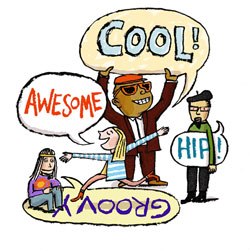
amaze-balls — amazing: e.g. «Your song was amaze-balls».
ass-kicking — excellent: e.g. «This is the most ass-kicking advice I’ve ever received».
awesome possum — variant of «awesome»: e.g. «That party was awesome possum».
bad-ass — cool, very good, excellent, cool: e.g. «That was a bad-ass concert».
bang on — accurate; perfect; right; or generally good: e.g. «Jane’s prediction of fourth-quarter earnings was bang on».
bodacious — totally cool, rad, hip: «That’s totally bodacious, dude!»
the bullet — cool: e.g. «This movie is the bullet!»
cheez whiz — cool, usually used after another term to form a superlative: e.g. «The clothes look so cheez whiz on him».
coolio — cool: e.g. «We leaving? Ok, coolio»; «You got new shoes? Koolio!»
crackin’ — cool, tight, etc. Also poppin’: e.g. «This party is crackin’!»
dope — very good, excellent, cool: e.g. «Ain’t nobody dope as me, I’m dressed so fresh so clean…Outkast!»
ear candy — something pleasing to listen to, especially music-related: e.g. «With an Ipod you can listen to as much ear candy as you want, when you want».
e-ticket ride — a ride of excitement or great fun: e.g. «That car chase looks like an e-ticket ride!»
gravy — very good, excellent, cool: e.g. «Man, you gone let that girl talk to you like that?- It’s all GRAVY. I am not worried about what that girl’s saying, man.»
horrorshow — very good, excellent; «cool». Origin: «horrorshow» is the phonetic spelling of a Russian word meaning «excellent»: e.g. «I thought the movie was horrorshow.»
kosher — fine, okay: e.g. «Is everything kosher?»
like whoa — cool, awesome, great: e.g. «Honey over there was like… WHOA»; «The weed I just smoked was like Whoa!»
neato — Used by losers when something is unusually COOL, other words similar to this would be dandy and spiffy: e.g. «That was really neato».
nifty — cool: e.g. «That was nifty, man».
off the chain — very good: e.g. «Girl, that purse is off the chain!»
pickles — cool: e.g. «Dat shit is pickles».
ratchet — cool, crunk, awesome. Also spelled ratchett: e.g. «I got three phone numbers last night, ’cause that’s how ratchett I am».
redonkulus — really cool or awesome: e.g. «Dude, you got a redonkulus deal on your new car».
slammin’ — great, excellent, awesome: e.g. «Your haircut is slammin’!»; «That was some slammin’ soup».
smashing — very good: e.g. «Smashing idea, darling!»
sugar honey ice tea — something great or awesome: e.g. «That was some serious sugar honey ice tea».
tickety-boo — going well; going smoothly: e.g. «I thought I had lost my keys, but I found them and everything was tickety boo».
vicious — Awesome, cool, wicked sweet: e.g. «That movie was so vicious».
wicked — very good, cool: e.g. «Man, dude, you’re a wicked driver!»
Click a Letter to view corresponding text slang terms:
- a3 :
- anyplace, anywhere, anytime
- aaaaa :
- American Assosciation Against Acronym Abuse
- aatf :
- always and totally forever
- abend :
- absent by enforced net deprivation
- acgaf :
- Absolutely couldn’t give a f**k
- adhd :
- Attention Deficit Hyperactivity Disorder
- afcpmgo :
- away from computer parents may go on
- ai :
- Artificial Intelligence
- aim :
- AOL instant messanger
- ajax :
- Asynchronous Javascript and XML
- akp :
- Alexander King Project
- akpcep :
- Alexander King Project Cultural Engineering Project
- alol :
- actually laughing out loud
- amsp :
- ask me something personal
- api :
- application program interface
- apod :
- Another Point Of Discussion
- asarbambtaa :
- All submissions are reviewed by a moderator before they are added.
- asbmaetp :
- Acronyms should be memorable and easy to pronounce
- asic :
- application specific integrated circuit
- asln :
- age, sex, location, name
- aslo :
- age sex location orientation
- aslop :
- Age Sex Location Orientation Picture
- aslp :
- age, sex, location, picture
- aslrp :
- age, sex, location, race, picture
- atfp :
- answer the f**king phone
- aup :
- acceptable use policy
- awb :
- Acquaintance with benefits
- ayc :
- awaiting your comments
- ayec :
- at your earliest convenience
– Все норм, спс!
– Пжлст.
Такие переписки в телефоне и социальных сетях уже никого не удивят. Но сокращения в английском языке пошли еще дальше наших: аббревиатурой становятся целые предложения!
Пример: MYOB = mind your own business (занимайтесь своим делом)
Ниже ты найдешь целый список английских сокращений (в смс, социальных сетях, форумах). Досконально изучи его, чтобы понимать, чего от тебя хотят англоговорящие собеседники.
В качестве предисловия: разговорные сокращения в английском языке
Разумеется, сокращения английских слов желательно использовать только в неформальной переписке (личные сообщения, чаты). При этом известен случай, когда 13-летняя девочка написала школьное сочинение, почти целиком построенное на аббревиатурах английского языка. Вот отрывок из него, попробуй прочитать и понять смысл написанного:
My smmr hols wr CWOT. B4, we used 2go2 NY 2C my bro, his GF & thr 3 :- kids FTF. ILNY, it’s a gr8 plc.
Получилось? А теперь прочитай “перевод”:
My summer hols (сокращенное – holidays) were a complete waste of time. Before, we used to go to NY (New York) to see my brother, his girlfriend and their 3 kids face to face. I love New York, it’s a great place.
Как видишь, английские сокращения на письме построены:
- на использовании цифр (4,
- на названиях букв (R = are, C = see)
- на выбрасывании гласных (smmr = summer)
- на акронимах – вид аббревиатуры, образованный начальными буквами (ILNY = I love New York).
Итак, переходим к нашему словарю английских сокращений.
Его Величество Сленг: расшифровка английских сокращений
В статье будет указан перевод сокращений с английского на русский. Но там, где потребуются дополнительные разъяснения, мы дадим и их. Enjoy!
& = and (и)
0 = nothing (ничего)
2 = two, to, too (два, предлог to, тоже)
2DAY = today (сегодня)
2MORO / 2MROW = tomorrow (завтра)
2NITE / 2NYT = tonight (сегодня ночью, сегодня вечером)
2U = to you (тебе)
4U = for you (для тебя)
4E = forever (навсегда)
AFAIK= as far as I know (насколько мне известно)
ASAP = as soon as possible (при первой возможности, как только – так сразу)
ATB = all the best (всего наилучшего)
Также читайте: Где смотреть сериалы на английском: список бесплатных сайтов
B = to be (быть)
B4 = before (до, прежде чем)
B4N = bye for now (пока, до встречи)
BAU = business as usual (идиома, означающая, что дела продолжают идти, как обычно, несмотря на сложную ситуацию)
BBL = to be back later (вернуться позже, быть позже)
BC = because (потому что)
BF = boyfriend (молодой человек, парень, бойфренд)
BK = back (назад, обратно)
BRB = to be right back (скоро вернуться). Например, ты “чатишься” с кем-то, но вынужден ненадолго отойти. BRB (скоро вернусь), – пишешь ты, и идешь по своим делам.
BRO = brother (брат)
BT = but (но)
BTW = by the way (кстати, между прочим)
BYOB / BYO = to bring your own booze, to bring your own bottle (“со своим алкоголем”). Указывается на приглашении в том случае, когда хозяин вечеринки не будет предоставлять выпивку для гостей. Кстати, у группы System Of A Down есть песня B.Y.O.B. (Bring Your Own Bombs вместо Bottle).
Текст песни читай здесь.
C = to see (видеть)
CIAO = goodbye (до свидания, пока). Это сокращение для переписки в английском языке образовалось от итальянского Ciao (и произносится оно именно так – чао).
COS / CUZ = because (потому что)
CUL8R = call you later / see you later (позвоню тебе позже / увидимся позже)
CUL = see you later (увидимся позже)
CWOT = complete waste of time (пустая трата времени)
D8 = date (дата, свидание)
DNR = dinner (ужин)
EOD = end of debate (конец дискуссии). Используется во время спора, когда хочется его прекратить: That’s it, EOD! (Все, прекратим спор!)
EZ = easy (легко, просто, удобно)
F2F / FTF = face to face (лицом к лицу)
F8 = fate (судьба)
FYI = for your information (к твоему сведению)
Также читайте: 33 лучших британских сленговых слова
GF = girlfriend (девушка, герлфренд)
GMTA = great minds think alike (поговорка “Великие умы мыслят одинаково”). Что-то вроде нашего “у дураков мысли сходятся” только наоборот 🙂
GR8 = great (замечательно, отлично и т.д.)
GTG = got to go (должен идти)
HAND = have a nice day (хорошего дня)
HB2U = happy birthday to you (с днем рождения)
HOLS = holidays (каникулы, отпуск)
HRU = how are you (как ты? как дела?)
HV = to have (иметь)
ICBW = it could be worse (могло быть хуже)
IDK = I dont know (я не знаю)
IDTS = I don’t think so (я так не думаю, не думаю, не согласен)
ILU / Luv U = I love you (я люблю тебя)
IMHO = in my humble opinion (по моему скромному мнению). Выражение уже давно перекочевало в наш интернет в виде транслитерации ИМХО.
IYKWIM = if you know what I mean (если ты понимаешь, о чем я)
JK = just kidding (просто шучу, это шутка)
KDS = kids (дети)
KIT = to keep in touch (оставаться на связи)
KOTC = kiss on the cheek (поцелуй в щеку)
L8 = late (поздно, недавно, за последнее время)
L8R = later (позже)
LMAO = laughing my ass out (так смешно, что пятую точку себе “отсмеял”).
LOL = laughing out loud (значение идентично предыдущему). Это популярное английское сокращение тоже позаимствовано нашим интернетным сленгом в виде транслитерации ЛОЛ.
LSKOL = long slow kiss on the lips (французский поцелуй)
LTNS = long time no see (давно не виделись)
Пример из стикеров для Viber
Luv U2 = I love you too (тоже люблю тебя)
M8 = mate (приятель, друг, чувак). Сленговое слово mate – примерно то же самое, что dude (чувак, пацан и т.д.): Hey, mate, what’s up? (Эй, чувак, как оно?)
MON = the middle of nowhere (идиома, означающая “очень далеко, у черта на куличках”)
MSG = message (сообщение, послание)
MTE = my thoughts exactly (ты читаешь мои мысли, я думаю точно так же)
MU = I miss you (скучаю по тебе)
MUSM = I miss you so much (скучаю по тебе очень сильно)
MYOB = mind your own business (занимайся своим делом, не лезь в чужие дела)
N2S = needless to say (само собой разумеется, очевидно что…)
NE1 = anyone (кто угодно, любой)
NO1 = no one (никто)
NP = no problem (без проблем, не проблема)
OIC = oh, I see (понятно; вот оно что). Используется в ситуации, когда ты хочешь показать собеседнику, что тебе понятен предмет разговора.
PC&QT – peace and quiet (тишина и покой). Идиома, которая чаще всего используется в контексте желания более спокойной жизни: All I want is a little peace and quiet (Все, что я хочу – немного тишины и покоя).
PCM = please call me (пожалуйста, позвони мне)
PLS = please (пожалуйста)
PS = parents (родители)
QT = cutie (милашка)
R = are (форма глаголы to be)
ROFL / ROTFL = rolling of the floor laughing (катаюсь по полу от смеха)
RUOK = are you ok? (ты в порядке? все хорошо?)
SIS = sister (сестра)
SKOOL = school (школа)
SMMR = summer (лето)
SOB = stressed out bad (чувствовать сильный стресс)
По ссылке это видео с субтитрами.
SOM1 = someone (кто-то)
TGIF = thank God it’s Friday (Слава Богу, сегодня пятница)
THX = thanks (спасибо)
THNQ = thank you (спасибо тебе)
TTYL = talk to you later (поговорим позже)
Также читайте: Список устойчивых выражений в английском языке
U = you (ты)
WAN2 = to want to (хотеть)
WKND = weekend (выходные)
WR = were (форма глагола to be)
WUCIWUG = what you see is what you get (что видишь, то и получишь)
Фраза была использована для креативных постеров кетчупа Heinz
Выражение имеет несколько значений:
- Свойство прикладных программ или веб-интерфейсов, в которых содержание отображается в процессе редактирования и выглядит максимально близко похожим на конечную продукцию (подробнее тут).
- Определение, которое используется, когда говорящий хочет показать, что нет ничего скрытого, нет никаких секретов и подводных камней.
Может использоваться, как определение честного и открытого человека:
He is a what-you-see-is-what-you-get kind of person. (Он относится к типу человека “что видишь, то и получишь”)
Также идиомой могут пользоваться, например, продавцы в магазине, когда уверяют нас, что товар, который мы купим, выглядит так же, как и на витрине:
The product you are looking at is exactly what you get if you buy it. What you see is what you get. The ones in the box are just like this one. (Если Вы купите этот продукт, то получите именно то, что видите сейчас. Единицы товара, которые в коробках, точно такие же, как эта).
X = kiss (поцелуй)
XLNT = excellent (отлично, превосходно)
XOXO = hugs and kisses (объятия и поцелуи). Точнее сказать “обнимашки и целовашки”, если следовать интернет-трендам 🙂
YR = your / you’re (твой / ты + форма глагола to be)
ZZZ.. = to sleep (спать) Сокращение используется, когда человек хочет показать собеседнику, что он уже вовсю спит / засыпает.
Напоследок: как понимать современные сокращения в английском языке
Как видишь, все английские сокращения в интернете поддаются определенной логике, принципы которой мы разобрали еще в начале статьи. Поэтому достаточно несколько раз “пробежаться по ним глазами”, и ты легко сможешь использовать и, главное – понимать их. CUL8R, M8 🙂
Do you find English so hard to learn? You have been learning English for at least a couple of years, even a decade but still cannot speak naturally to or hard to catch native speaker’s phrases precisely? There should be a language gap between what you learn in school and real life.
It is a fact that native speakers use English slang words in their conversations so often. A high possibility is that you might focus too much on learning academic vocabulary and miss out on learning famous English slang words.
In this article, we suggest a new learning aspect with Word Cloud to improve your English competency, in particular, English slang words. You will have a chance to access the ultimate list of 60 most famous English slang words, phrases, their meaning and examples that are used in both America, and England, and some old English slang words, too.
Table of Contents
- The Reasons to Learn English Slang Words
- British Slang – English Slang Words
- American Slang – England Slang Words
- The Bottom Line

More Tips with AhaSlides
- Live Word Cloud Generator
- Idea Generation Process
- Collaborative word cloud
The Reasons to Learn English Slang Words
If you still wonder why learning English Slang words is beneficial, here are the five reasons:
- Fit the new environment and expand relationship networking quickly
- Increasing the rate of accuracy in expression and preventing faux pas and misunderstanding
- Promoting a sense of belonging and having deep ties to culture and traditions
- Learning deep insight into local history and past events
- Presenting personal opinions and evoking emotions a more fresh and meaningful way to deal with any kind of conversation and speech
Start in seconds.
Beyond English Slang Words, learn how to set up a proper online word cloud, ready to share with your crowd!
🚀 Get Free WordCloud☁️
- Ace – is used to describe something that is awesome. A word that is popular in the north and amongst youngsters.
- A load of tosh – is used to describe something that is not very good. For example, your lecturer might describe your essay “as a load of tosh” …. harsh!
- Bees knees – the phrase does not relate to bees or knees but is an idiom for excellent. It became popular in the 1920s along with “cat’s whiskers.”
- Bird: This is British slang for a girl or a woman.
- Bevvy – The short for the word “beverages,” usually alcoholic, most often beer.
- Bloody: As British slang, “bloody” places emphasis on a comment or another word. “That’s bloody brilliant!” for example. It is regarded as a mild expletive (swear word) but due to its common usage, it is generally acceptable. For example, “Oh bloody hell!”
- Bonkers: Can mean either “crazy” or “angry” depending on the context. Someone can be “completely bonkers” or can “go bonkers” (the latter can also mean losing your temper).
- Bollocking – You get a bollocking when you’ve done something you shouldn’t have. “I didn’t do my homework and the teacher gave me a right bollocking”.
- Butcher’s hook –originates from the East End of London and is a rhyming slang for taking a look.
- Can’t be arsed: A commonly used British slang sentence is “Can’t be arsed.” This is a less polite version of saying that you can’t be bothered doing something. You might also see this abbreviated to “CBA” in textspeak.
- Cheers: A multi-purpose word that can be used as a toast, to thank someone or even say goodbye.
- Cheesed off – is a quirky euphemism for being unhappy. Obviously, you would be unhappy if your cheese went off! It can be used in casual and formal situations for example someone could say “I’m cheesed off that you ate the last piece of cake.”
- Chuffed: If someone is “chuffed,” they are very happy or delighted
- Dead: A common English slang word for “very”, particularly in the north of England. “Did you see that bloke? He’s dead gorgeous”.
- Donkey’s years – Apparently donkey’s live for a long time so when someone says “I haven’t seen you for donkey” they are saying they haven’t seen you in a long time.
- Dodgy: Untrustworthy. A person can be dodgy but so can an object: “I think I ate a dodgy curry”.
- Easy peasy – A fun and childish way of expressing something is easy to do or understand. We dare you to use it next time your lecturer is explaining something.
- Earful – is an expression used to describe someone who is being told off. For example, you may hear someone say “They got an earful for being so loud last night.”
- Ends: London slang for the area you’re from. It’s important to represent your ends.
- Fancy: Used as a verb to show a desire for something or someone. “I really fancy her” is a profession of a love interest, but you could also ask someone: “Do you fancy some lunch?”.
- Flogging a dead horse – to try and find a solution to a problem that is unsolvable. For example: “You’re flogging a dead horse by asking Martha to move to the UK – she hates rain”
- Jokes: Used as an adjective, to mean “funny” or just “fun”. “Let’s go into town tonight mate, it’ll be jokes”.
- I’m easy – next time you are in a restaurant and your friends are debating what to order just say “order whatever. I’m easy”. That’s a signal that you’re happy with whatever they order.
- Jim jams – is slang for pyjamas and as a student, you’ll hear “I think it’s time to put on my Jim jams and get into bed – I’m exhausted!” – a lot!
- Lemon: If you think that someone looks foolish because they are shy or slow to take action, you can say that they are like a lemon. Eg: I just stood there like a lemon.
- Lush: Heard a lot in Wales but also in parts of northern England to mean “great” or “very nice”.
- Leave it out – means you want someone to stop doing or saying something that you find upsetting or annoying.
- Plonker: Someone who is a bit stupid or annoying. A little bit more affectionate than calling someone a pillock. “Don’t be such a plonker”.
- Shook: London street slang for “scared”.
- Rosie lee – is cockney rhyming slang for a cup of tea.
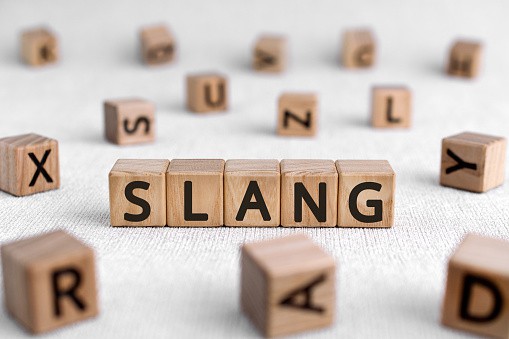
American Slang – English Slang Words
- Bummer: A disappointment. Eg. “That’s such a bummer. I’m sorry that happened.”
- Chick: a word to indicate a girl or young woman. Eg. “That chick is hilarious.”
- Chill: means relax. Eg: I will go to Pari to chill for my upcoming holiday
- Cool: same as awesome means “great” or “fantastic.” It also shows that you’re okay with an idea that is given by others.
- Couch potato: a person who takes little or no exercise and watches a lot of television. Eg: ‘It is no good you being a couch potato and having a Dobermann”
- Cram: Study like crazy. Eg: I am gonna take a history test and now I have to cram as much knowledge as possible.
- Flakey: is used to describe someone indecisive. Eg: “Garry is so flakey. He never shows up when he says he will.
- Flick: the movie. Eg: The flick Avatar is worth watching.
- Hypebeast: Someone who only wants to be popular
- I can’t even!: used without the following phrase to indicate that the speaker is overwhelmed with emotion. Eg: “This is just so ridiculously cute. I can’t even.”
- I don’t buy that: I don’t believe it
- I’m down: I’m able to join. Eg. “I’m down for ping pong.”
- I’m game: I’m up for that. Eg: that you are willing to do it/want to do it. Eg: does anyone want to go to a nightclub tonight? I’m game.
- In no time: Very soon. Eg. “We’ll have our homework done in no time.”
- In the bag: North American word for drunk. Eg: After a long night in the pubs, he was in the bag”
- It sucked: It was bad/poor quality. Eg. “That movie sucked.”
- Lame: The opposite of cool or fantastic. Eg. “That’s so lame that you can’t go out tonight.”
- Lighten up: mean relax. Eg. “Lighten up! It was an accident.”
- My bad: means My mistake. Eg. “My bad! I didn’t mean to do that.”
- No biggie – It’s not a problem. Eg: “Thanks for tutoring me, David!” – “No biggie, Lala.”
- Once in a blue moon: means very rarely. Eg: “he comes round once in a blue moon”
- Party animal: someone who enjoys parties and party activities very much and goes to as many as possible. Eg: Sarah’s a real party animal – she likes to dance all night.
- Rip-off: A purchase that was very overpriced. Eg. “That phone case was a rip-off.”
- Same here: mean “I agree”. Eg: “I’m having a hard time studying for this exam.” – “Same here.”
- Score: Get what you want, or have sex with someone that you have usually just met: Did you score last night, then?
- Screw up: To make a mistake. Eg. “Sorry I screwed up and forgot our plans.”
- That’s the stuff: That’s really great or satisfying. Eg: Ah, that’s the stuff. Nothing like a cold beer after a long day’s work.
- That’s rad: That’s exceptionally good, excellent, cool, or exciting. Eg: You’re going to the BlackPink concert too? That’s rad!
- Tying the knot: If you say two people tie the knot, you mean they get married. Eg: Len tied the knot with Kate five years ago.
- Wasted – Intoxicated. Eg. “She was wasted last night.”
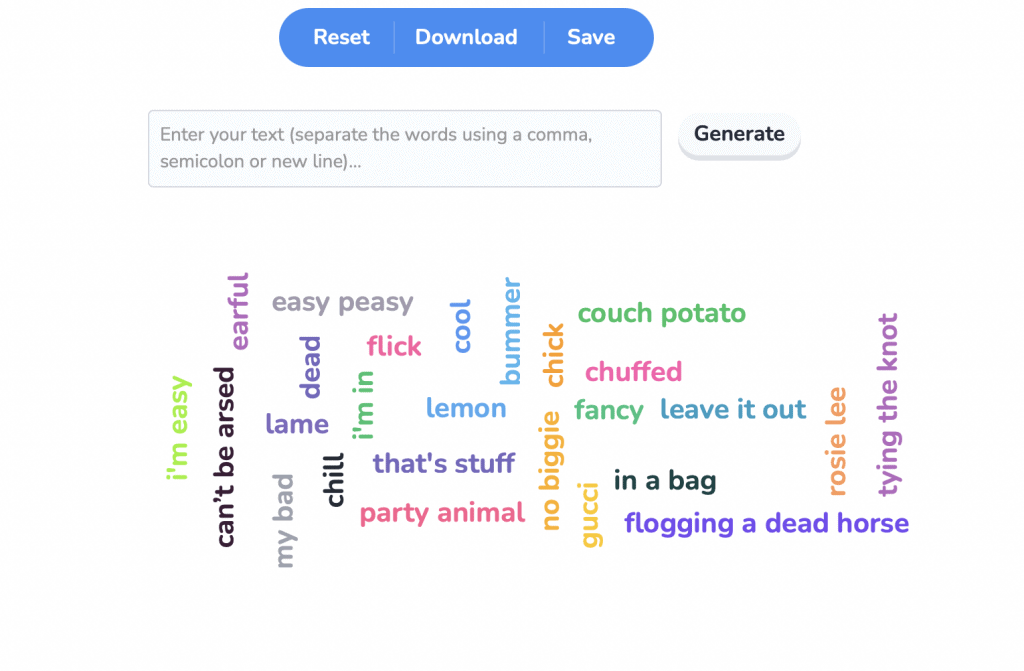
The Bottom Line
Basically, there is no way to speak like a native if you don’t add some English slang words in your vocabulary list. Learning new words is more challenging if you don’t practice them so often. If you are thinking of a game idea to learn new words effectively while having fun, why don’t you try AhaSlides Word Cloud. For learners, educators, and trainers, you can leverage the Word Cloud game to help you build cool and fancy language learning and teaching programs.
Обычно мы используем сленг, когда хотим, чтобы наша речь звучала менее официально и более задористо. К тому же, сленговые слова и выражения нередко употребляются в современных фильмах и сериалах.
Сленг может сильно меняться в зависимости от регионов и городов, что уж говорить о различиях между британским и американским сленгом, а тем более, «своими словами» в Канаде, Австралии и других странах.
Когда мы говорим о том, что какое-то слово «популярно» — мы имеем в виду, что его используют большинство носителей языка в своей повседневной речи.
Сегодня поговорим о сленговых выражениях в английском языке и жаргоне, который можно встретить в речи иностранцев. Конечно, все это — с переводом и примерами употребления.
Интересно, что сами носители языка могут легко понять откуда родом человек не только по акценту, но и по сленгу, который он использует. Давайте познакомимся с некоторыми популярными британскими и американскими словами поближе.
Британский сленг
Язык трансформируется из года в год, новые поколения привносят в него свои фразочки и выражения, но кое-какие английские жаргонизмы не устаревают со времен панк-культуры семидесятых, а некотоыре «живут» еще с начала XX века.
Argy–bargy — дурацкий спор или стычка
Используется в основном для того, чтобы показать нелепость происходящего.
I’m not going to get into an argy–bargy about it — Я не собираюсь вступать в идиотский спор из-за этого
Barmy — придурошный
Так говорят о человеке, который странно себя ведет. Мы бы назвали такого «чудилой». Также, слово barmy можно употребить в отношении чего-то глупого и странного (дурацкого поступка, например).
Stop playing the ape. They’ll think you’re barmy — Прекрати кривляться. Они подумают, что ты чокнутый
Bonkers — сумасшедший
По сути то же самое, что и crazy.
He is a bit bonkers, but quite a nice guy — Он слегка сумасшедший, но довольно милый парень
Bollocks — чушь, ерунда
Это слово есть даже в названии культового альбома Sex Pistols: «Never Mind the Bollocks, Here’s the Sex Pistols» (Не обращай внимания на ерунду, здесь Sex Pistols).
He’s talking bollocks! — Он несет полную чушь!
Booze — выпивка, алкоголь
Жаргонный аналог привычного alcohol. В Британии используется повсеместно, в США реже, но все же встречается в разговоре.
He’s got problems with booze — У него проблемы с выпивкой
Brass Monkey — жуткий холод
В России мы бы сказали «собачий холод», но британцы предпочитают выражение, которое дословно переводится как «медная обезьяна».
You need to wear a coat and a hat today, it’s brass monkey outside — Тебе лучше бы одеть пальто и шапку сегодня, на улице собачий холод.
Blimey — удивление, изумления
Это не поддающееся прямому переводу восклицание. Считается, что это слово пошло от словосочетания «blind me», которое можно перевести как «да чтоб я ослеп».
Blimey, you frightened me! — Батюшки, ну и напугал ты меня!
Budge up — просьба подвинутся
Нужно попросить друга подвинуться и дать вам сесть? Используйте это выражение!
I want to sit down too, could you budge up a little, please? — Я тоже хочу сесть, не мог бы ты подвинуться немного?
Cuppa — чашка чая
Довольно простое слово, образованное от cup of tea.
Would you like a cuppa? — Хотите чаю?
Chippy — место, где продают fish&chips
Разговорное выражение для самого британского фаст-фуда.
I’m gonna have supper at the nearest chippy — Я собираюсь поужинать в ближайшем месте, где подают рыбу с картошкой.
Chuffed — быть чем-то очень довольным
Легко запомнить, если представить, что кто-то пыхтит от радости со звуком «чафф», созвучным с этим словом.
He was chuffed to get new car — Он был очень рад, что купил новую машину
Cock-up — провал
Хоть слово cock переводится как «петух», в сочетании с up оно превращается в эдакий эпичный fail.
The papers sent out to our colleagues were all in the wrong language. What a cock-up! — Бумаги, отправленные нашим коллегам были все на другом языке. Это полный провал!
Dear — дорого (о стоимости)
Это слово можно перевести не только как «дорогая» (сердцу, например), но и использовать, говоря о чем-то слишком дорогом.
That’s too dear for me now — Это слишком дорого для меня сейчас
Doofer — штуковина, штука
Обычно употребляется, когда не можешь вспомнить слово. Вроде вот вертится на языке, но точного названия никак не припомнить.
What is that doofer? — Это что еще за штуковина?
Gobsmacked — быть в шоке
Используется в ситуации крайней удивленности. Полагают, что слово произошло от слова «gob» (рот), ведь когда ты чем-то шокирован — у тебя буквально открывается рот и вытягивается лицо.
I was gobsmacked when she told me she was pregnant — Я был шокирован, когда она сказала мне, что беременна
Hunky-Dory — все в порядке
Выражение используется как аналог «все окей» или «все пучком».
Don’t worry, everything’s hunky-dory at home — Не беспокойся, дома все пучком
Kip — короткий сон
Также глагол, обозначающий «вздремнуть ненадолго».
Why don’t you try and have a kip before everyone gets here? — Почему бы тебе не попытаться недолго вздремнуть перед тем, как все придут?
Knees-up — вечеринка
А точнее — «попойка», где все пьют и веселятся.
On the night their exam results came out, they went down to the pub for a knees-up — В ночь, когда результаты экзаменов опубликовали, они пошли в паб на тусовку
Mate — приятель
По-русски мы бы сказали «дружище, старина, кореш», но для британцев это — mate. Кстати, оно достаточно популярно и в американском английском, но не так, как buddy или dude, о которых мы поговорим ниже.
Good job, mate! – Отличная работа, приятель!
Minger — урод, мерзость
Британцы используют это слово, чтобы назвать что-то противное или неприятное. От него происходит и прилагательное minging.
Don’t get excited, she might be just another minger — Не нужно так волноваться, она может оказаться просто очередной уродиной.
Plonk — дешевое вино
Обычное столовое вино, портвейн, одно из самых дешевых в своей категории.
I’ll pick up some snacks, and you, girls, bring the plonk — Я прихвачу закуски, ну а вы, девчата, захватите винишко
Row — ссора
Глагол можно перевести как «поссориться» или «повздорить».
James had a huge row with his girlfriend yesterday — Джеймс сильно повздорил вчера со своей девушкой.
Scrummy — что-то очень вкусное
Слово обычно используется для выражения восхищения едой. Мы бы сказали что это так вкусно, что «аж слюнки текут».
Granny’s apple pie was absolutely scrummy — Бабулин яблочный пирог был просто бесподобен
Кстати, про людей тоже можно сказать scrummy в значении «вкусняшка», сексуально привлекательный человек.
Skive (off) — отлынивать
Обычно применяется по отношению к школьникам, что прогуливают занятия или работникам, которые ищут причины не идти на работу.
He tried to skive off work but got caught by his boss — Он попытался сачкануть от работы, но его поймал начальник
Skint — быть на мели
Ну а попросту, без гроша в кармане.
Sorry guys, I can’t join you this time. I’m skint — Извини, ребята, не смогу присоединиться к вам в этот раз. Я на мели
Sod’s Law — закон подлости
Произошло от разговорного sod, что означает «бедолага».
It was a sunny day and then after I step out of the house it immediately starts to rain. Stupid sod’s law! Был солнечный день, но как только я вышел из дома, сразу же пошел дождь. Дурацкий закон подлости!
Splash out — потратить много денег
Дословно — «выплеснуть» слишком много денег куда-то.
I wanted to give Lizzy a special treat for her birthday, so I splashed out on a diamond ring. — Я хотел подарить Лиззи что-то особенное на день рождения, поэтому разорился на бриллиантовое кольцо.
Wicked — что-то потрясающее
Изначально это слово переводится как «злой», но британцы часто используют его для описания чего-то очень крутого.
Wicked! Thank you for the exciting news! — Просто чума! Спасибо за такие волнующие новости!
Wind up — приколоться над кем-то, подшутить
В прямом переводе слово означает «заводиться», но на сленге — приколоться над кем-то, то есть намеренно говорить неправду ради шутки.
I was just winding her up for fun, but she got really angry! — Я просто подколол ее ради смеха, но она разозлилась не на шутку!
Американский сленг
Пожалуй первое, что приходит на ум, когда размышляешь об американском сленге — уличная хип-хоп культура. Да, она несомненно подарила массу слов, которые затем «растаскали» по всему миру поклонники рэпа, но американский сленг развивается не только благодаря Тупаку или Джей Зи. Как и везде, главными трендсеттерами в использовании новых слов в США являются подростки.
Ain’t — отрицание
По сути, это просто сокращенный глагол «to be» с отрицанием (am/is/are not = ain’t)
You ain’t going home tonight — Ты сегодня не пойдешь домой
Aight — все в порядке
Тут все легко: это сокращение от слов all right.
I’m aight, thanks! — Я в порядке, спасибо!
A-ok — все в порядке
Еще один способ сказать, что у вас все нормально. Американский аналог британского выражения hunky-dory.
Don’t worry, everything’s gonna be a-ok. — Не волнуйся, все будет пучком.
Babe at the woods — слишком доверчивый и наивный человек
По-русски мы бы сказали, что он «дурачок» или «сущий младенец» в том смысле, что доверяет всем подряд.
Don’t play a babe in the woods with me, I’m not an idiot! — Не надо тут со мной дурачка разыгрывать, я не идиот!
Banana oil — недоговаривать, врать, льстить
В русском языке это «вешать лапшу на уши», а вот в американском — лить в уши банановое масло. Не стоит пытаться это понять, лучше просто запомнить.
Stop! It’s banana oil. I know the truth — Прекращай вешать мне лапшу на уши. Я знаю правду
Bounce — уходить, свалить
На сленге так говорится о факте ухода.
I’m gonna bounce outta here — Я собираюсь отсюда сваливать
Chew the fat — болтать ни о чем, сплетничать
По-русски мы бы сказать «чесать языками» или «точить лясы». Дословно эта фраза переводится как «жевать жир», в чем мало логики: лучше просто запомнить этот забавный оборот таким, какой он есть.
My colleagues don’t work at all. They are always chewing the fat — Мои коллеги совершенно не работают, только болтают без умолку
Chill — расслабление, релакс
Это слово известно и в русском языке. Можно часто услышать, например, «давай почилим здесь недолго», что значит «отдохнем».
I’m really tired, man. Now I’m just chilling — Я реально устал, чувак. Сейчас я просто бездельничаю
Crack up — заставить кого-то сильно смеяться
По-русски мы бы сказали «лопнуть со смеху».
What a funny joke! You crack me up — Какая забавная шутка! Ну ты и насмешил.
Dude — чувак
Довольно старое слово, но актуально и по сей день. Наряду с dude американская молодежь часто использует слова bro, homie и другие.
Dude, where’s my car? — Где моя тачка, чувак?
Fail — неудача
Слово, знакомое нам не по наслышке. Оно уже прочно перекочевало в русский язык как фейл.
I thought to spend the night with this girl but failed — Я думал провести с этой девушкой ночь, но провалился с этим.
For real — удивление
Обычно задается как вопрос:
You say that you were fired. For real? — Говоришь, что тебя уволили. Реально?
Gross — мерзкий, противный, неприятный
Американский аналог британского minging.
Stop picking your nose, it’s gross! — Хватит ковыряться в носу, это мерзко!
Holla — дать знать о чем-то
Обычно употребляется американцами как высказывание намерения сделать что-то.
If you need anything, just give me a holla — Если тебе что-то нужно, просто дай мне знать.
Еще можно использовать как неформальное приветствие (Holla!) или в значении «позвонить»:
I’ll holla at you tonight — Я наберу тебя сегодня
Homie — брат по духу
Так американцы говорят о «своих ребятах», корешах и братюнях.
These are all my homies here — Это все мои кореша.
Jerk — болван
Так американцы говорят о глупом, раздражающем человеке.
Do you know Matthew? What a jerk, isn’t he? — Знаешь Мэтью? Ну и болван, скажи?
Lame — отстойный
Используется как прилагательное для описания чего-то совсем не крутого и стремного.
Sorry, but your party’s so lame. I’m out — Извини, но твоя вечеринка такая отстойная. Я ухожу.
Lit — что-то очень крутое
Новое слово, чтобы выразить что-то ошеломительное, гораздо сильнее по эмоциональной окраске, чем просто cool или crazy.
That was lit! — Это было просто снос башки!
Nuts — сумасшедший
То же самое, что и crazy.
Are you nuts?! — Ты что, с ума сошел?!
Raincheck — просьба перенести что-то на другое время
Это вовсе не «проверка дождя». Словосочетание пошло от возможности обменять билет на спортивный матч в случае дождя.
I was afraid you were gonna give me a raincheck — Я испугался, что ты можешь перенести встречу
Salty — обиженный на что-то, злой
Американцы называют кого-то «соленым» на сленге, когда хотят сказать, что человек обижен или «дуется».
She always gets so salty when I miss her calls — Она всегда так обижается, если я пропускаю ее звонки.
Suck — отстой
Употребляется как глагол. Что-то вроде «я плох в этом». А вот sucks переводится как наречие (отстойно, хреново).
You know, I suck at relationships — Знаешь, я отстой по части взаимоотношений.
Weird — странный
От этого слова происходит также weirdo — существительное, которое можно перевести как «чудак».
You could’ve just asked for her phone number, weirdo — Мог бы просто взять у нее номер телефона, чудила.
Yummy — вкусный
Так говорят о чем-то очень аппетитном и нереально вкусном.
This is the best cake I’ve ever had. Yummy! — Это лучший торт, который я когда-либо ел. Вкусняшка!
Если вам интересна тема современного английского языка — обязательно загляните в нашу статью о популярных сокращениях в переписке.
Бонус: сленг рэперов
Американская хип-хоп культура — это отдельное явление в мире сленга. У ее представителей сформировался особый язык, зачастую непонятный простым обывателям. Чем популярней становился хип-хоп, тем больше людей стали употреблять эти слова в разговорной речи, а позже некоторые выражения перекочевали и в другие языки.
Вот распространенные слова, которые можно встретить на американских просторах, от бедных кварталов Чикаго до роскошной вечеринки в LA. Check this out (зацените):
Boys in blue / five o / coppers / cops — полицейские
Cabbage — деньги, «капуста»
Cellie — сотовый телефон
Dawg — близкий друг, “свой”, кореш
Dead presidents — купюры (от того, что на долларах изображены бывшие президенты США)
Dough — деньги
Cheese — деньги
Flashin — злиться, нервничать
Flow — стиль читки в рэпе
Homies — близкие друзья, друганы
Hood — район (сокращение от neighborhood)
Hype — хайп, шумиха
Hustla — гангстер, занимающийся любой незаконной деятельностью
Gang — банда
Lowrider — заниженная машина
OG — настоящий гангстер (original gangster). Сегодня чаще означает просто “настоящий” (original)
Peeps — чуваки
Props — дань уважения за что-либо
Respect — уважуха
Shawdy (shorty) — девушка
Stilo — стиль (от style)
Thug — гангстер
Tag — подпись (обычно под граффити или рисунком)
To dis — опустить (от слова disrespect — «неуважение»)
Trill — уважаемый, крутой (от слов true + real)
Vibe — атмосфера, ощущения от чего-то
Wack — чушь, отстой
Выразить что-то крутое и нереальное можно многими словами и помимо cool: bomb, dope, hot, boo-yaa, crazy, off tha hook.
Как видите, сленг явление само по себе уникальное и непостоянное. Для того, чтобы быть в курсе всех модных словечек, нужно регулярно общаться с носителями языка, причем, желательно, в неформальной обстановке. Плюсы очевидны: и разговорный английский подтянете, и узнаете много нового.
See ya, mates!


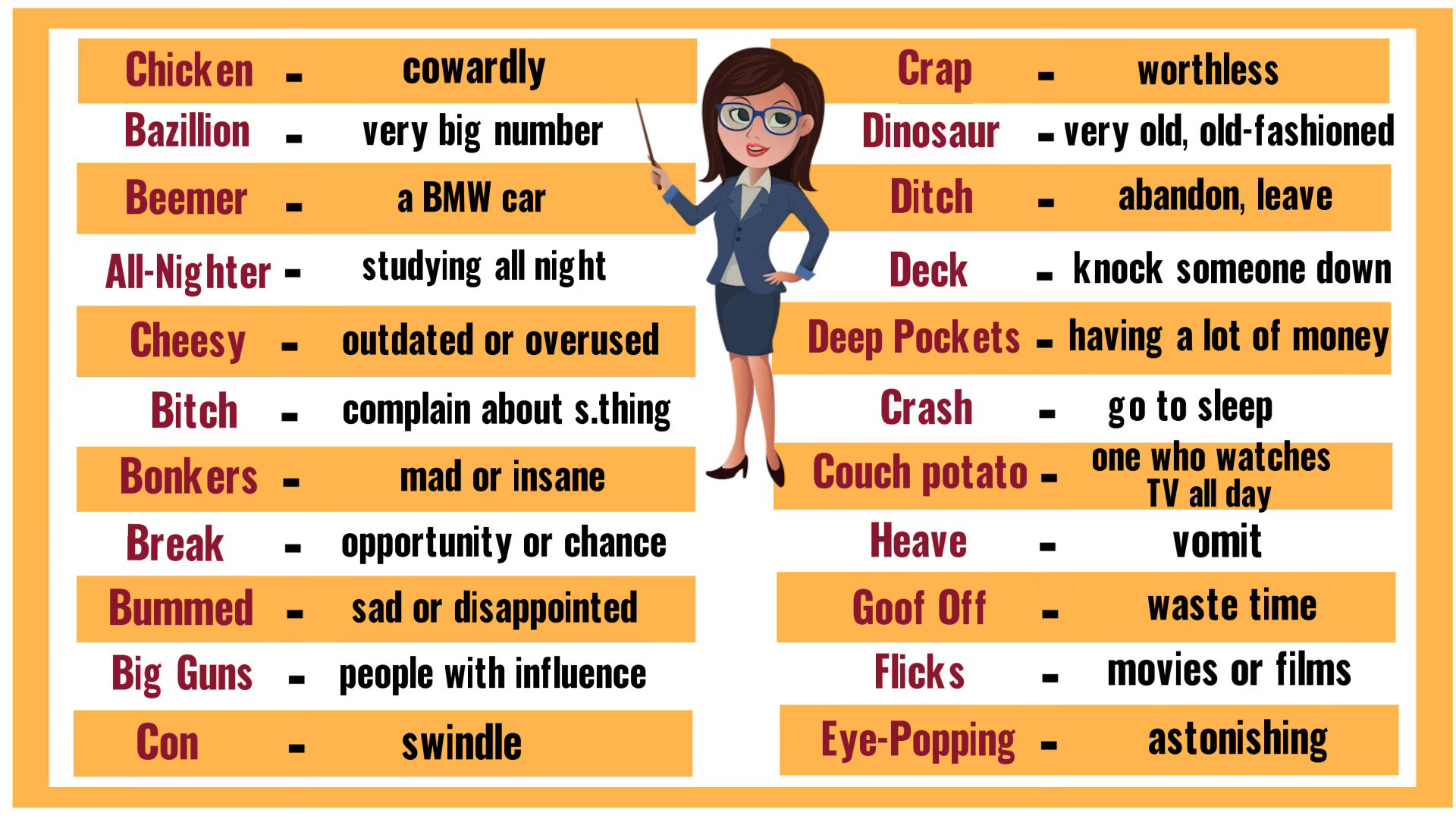
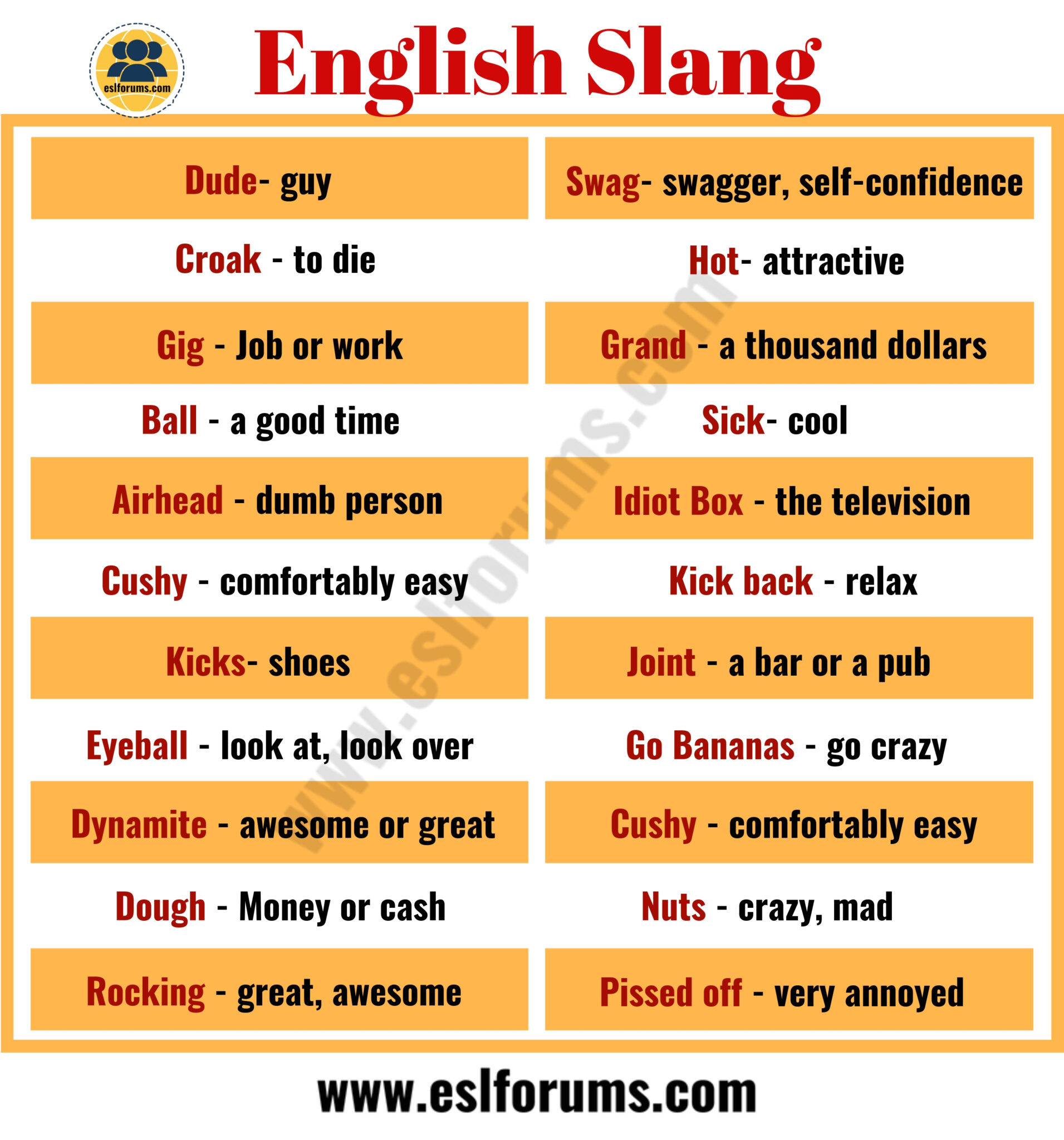

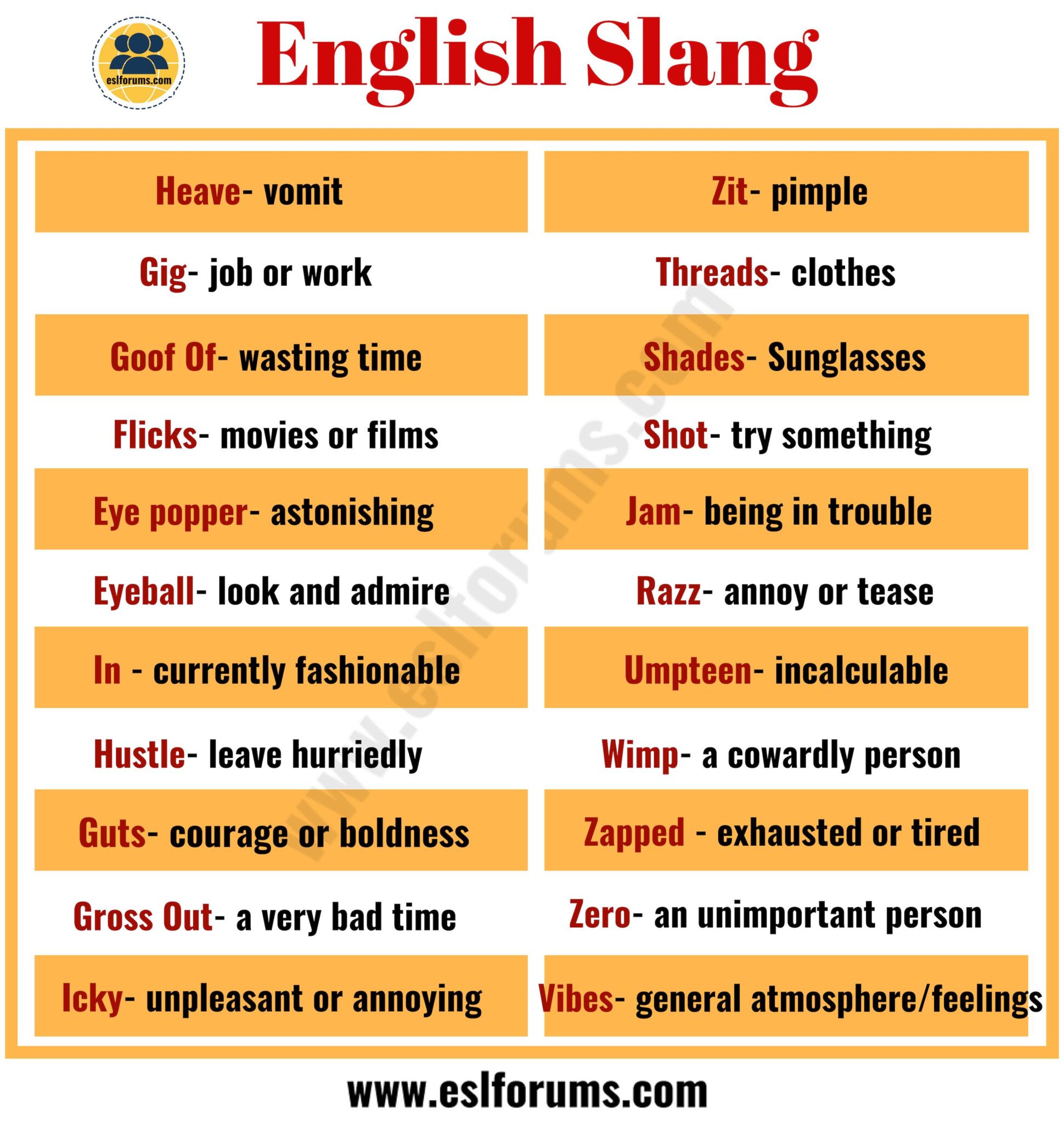













 — smile
— smile — sad
— sad — wink
— wink





